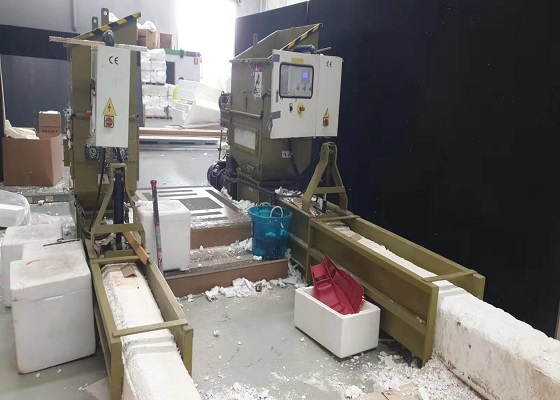GREENMAX styrofoam compactor may help the coastal city of La Rochelle solve the problem of styrofoam fish box waste
The recycling of Styrofoam is progressing locally, under the impetus of the Syndicat mixte du port de pêche de La Rochelle, chaired by elected official Christophe Bertaud. In 2021, the Chef-de-Baie fish market acquired a machine capable of compressing the crates used for storing and transporting the 22,000 tons of seafood that pass through the platform each year, generating a turnover of around 300 million euros.
In fact, seafood-related industries will generate more Styrofoam waste. Whether it is in the fishing stage, processing stage, or transportation stage, Styrofoam boxes may be generated. Therefore, the seafood field has always been an area that needs to focus on styrofoam waste recycling. More and more practitioners in related industries choose to use compression equipment such as a styrofoam compactor to recycle fish boxes.
.jpg)
GREENMAX Marine Stand APOLO C200 is a styrofoam compactor for compacting wet, salty, and dirty styrofoam fish boxes, and it is well received in the fish industry. APOLO C200 Styrofoam Compactor can compact polystyrene fish boxes, polystyrene boxes, and bulky coolers into dense blocks, reducing storage space and transportation costs. The materials used include styrofoam fish boxes, XPS (extruded polystyrene), and PSP (polystyrene paper).
By recycling styrofoam fish boxes, especially after they are compressed during the recycling process, this waste can be transformed into new and useful products. For example, recycled styrofoam fish boxes can be used to make building insulation materials, plastic panels, flower pots or other plastic products used in daily life. This can reduce the demand for raw materials (such as oil, natural gas, etc.), thus saving natural resources. Not only that, it can reduce environmental pollution to a great extent, which is also an issue that we are more concerned about. By recycling foam and reusing it, carbon emissions can be significantly reduced, as producing new plastic often requires large amounts of energy and raw materials. The use of compressed and recycled foam plastic products not only reduces waste, but also reduces carbon emissions, which has a positive effect on mitigating climate change.

Styrofoam fish boxes degrade very slowly in the natural environment and tend to accumulate in soil and water sources. By recycling and reusing foam plastics with the styrofoam compactor, the potential impact of these harmful substances on the environment and food chain can be reduced, and they can also be compressed to one-fiftieth of their original volume, saving disposal costs.
